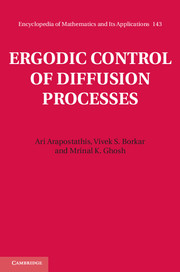Book contents
- Frontmatter
- Contents
- Preface
- Frequently Used Notation
- 1 Markov Processes and Ergodic Properties
- 2 Controlled Diffusions
- 3 Nondegenerate Controlled Diffusions
- 4 Various Topics in Nondegenerate Diffusions
- 5 Controlled Switching Diffusions
- 6 Controlled Martingale Problems
- 7 Degenerate Controlled Diffusions
- 8 Controlled Diffusions with Partial Observations
- Epilogue
- Appendix: Results from Second Order Elliptic Equations
- References
- Index of symbols
- Subject index
7 - Degenerate Controlled Diffusions
Published online by Cambridge University Press: 05 December 2011
- Frontmatter
- Contents
- Preface
- Frequently Used Notation
- 1 Markov Processes and Ergodic Properties
- 2 Controlled Diffusions
- 3 Nondegenerate Controlled Diffusions
- 4 Various Topics in Nondegenerate Diffusions
- 5 Controlled Switching Diffusions
- 6 Controlled Martingale Problems
- 7 Degenerate Controlled Diffusions
- 8 Controlled Diffusions with Partial Observations
- Epilogue
- Appendix: Results from Second Order Elliptic Equations
- References
- Index of symbols
- Subject index
Summary
Introduction
In this chapter we turn to the study of degenerate controlled diffusions. For the nondegenerate case the theory is more or less complete. This is not the case if the uniform ellipticity hypothesis is dropped. Indeed, the differences between the nondegenerate and the degenerate cases are rather striking. In the nondegenerate case, the state process X is strong Feller under a Markov control. This, in turn, facilitates the study of the ergodic behavior of the process. In contrast, in the degenerate case, under a Markov control, the Itô stochastic differential equation (2.2.1) is not always well posed. From an analytical viewpoint, in the nondegenerate case, the HJB equation is uniformly elliptic and the associated regularity properties benefit its study. The degenerate case, on the other hand, is approached via a particular class of weak solutions known as viscosity solutions. This approach does not yield as satisfactory results as in the case of classical solutions. In fact ergodic control of degenerate diffusions should not be viewed as a single topic, but rather as a class of problems, which are studied under various hypotheses.We first formulate the problem as a special case of a controlled martingale problem and then summarize those results from Chapter 6 that are useful here. Next, in Section 7.3, we study the HJB equations in the context of viscosity solutions for a specific class of problems that bears the name of asymptotically flat diffusions.
Information
- Type
- Chapter
- Information
- Ergodic Control of Diffusion Processes , pp. 253 - 278Publisher: Cambridge University PressPrint publication year: 2011
